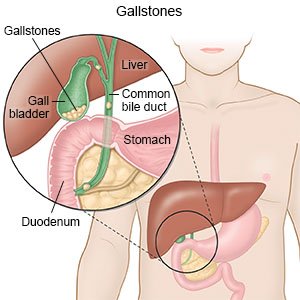Gallstones
Medically reviewed by Drugs.com. Last updated on Apr 2, 2024.
Gallstones are hard substances that form in your gallbladder or bile duct. Your gallbladder and bile duct are located on the right side of your abdomen, near your liver. Your gallbladder stores bile. Bile helps break down the fat that you eat. Your gallbladder also helps remove certain chemicals from your body.
 |
WHILE YOU ARE HERE:
Informed consent
is a legal document that explains the tests, treatments, or procedures that you may need. Informed consent means you understand what will be done and can make decisions about what you want. You give your permission when you sign the consent form. You can have someone sign this form for you if you are not able to sign it. You have the right to understand your medical care in words you know. Before you sign the consent form, understand the risks and benefits of what will be done. Make sure all your questions are answered.
You may only be able to have clear liquids
for a certain period of time. You will not be able to eat solid food during this time. You can drink water, broth, apple juice, or lemon-lime soft drinks. You may also suck on ice chips or eat gelatin. Your healthcare provider may give you specific instructions to follow.
A nasogastric (NG) tube
is put into your nose and moved down your throat until it reaches your stomach. Liquid, nutrition, or medicine may be given through an NG tube. The tube may instead be attached to suction if healthcare providers need to keep your stomach empty.
Medicines:
- Antinausea medicine may be given to calm your stomach and to help prevent vomiting.
- Pain medicine may be given. Do not wait until the pain is severe before you ask for more medicine.
Tests:
You may be given contrast liquid before certain tests. The contrast liquid makes your gallbladder and its ducts show up in the pictures. Tell the healthcare provider if you have ever had an allergic reaction to contrast liquid. If you are a woman, tell your healthcare provider if there is any chance you could be pregnant.
- Blood tests may show signs of infection or inflammation.
- Endoscopic retrograde cholangiopancreatography (ERCP) is a test used during an endoscopy to find stones, tumors, or other problems. If you have stones, they may be removed during ERCP.
- Oral cholecystography is a test to look at your gallbladder and its ducts (passages). You will take pills that have contrast liquid in them. Then x-rays are taken over time. This may make it easier for your healthcare provider to see any stones or swelling in your gallbladder.
Treatment:
Surgery may be used to remove your gallbladder.
RISKS:
Gallstones may block the bile duct and lead to inflammation of the gallbladder. Small gallstones may also cause a blockage in the small intestines. Infection of the gallbladder and swelling of the pancreas may also occur. Surgery to remove your gallbladder may cause infection and injury to the bile duct.
CARE AGREEMENT:
You have the right to help plan your care. Learn about your health condition and how it may be treated. Discuss treatment options with your healthcare providers to decide what care you want to receive. You always have the right to refuse treatment.© Copyright Merative 2024 Information is for End User's use only and may not be sold, redistributed or otherwise used for commercial purposes.
The above information is an educational aid only. It is not intended as medical advice for individual conditions or treatments. Talk to your doctor, nurse or pharmacist before following any medical regimen to see if it is safe and effective for you.
Learn more about Gallstones
Treatment options
- Medications for Cholelithiasis w/ Acute Cholecystitis and Obstruction
- Medications for Cholelithiasis with Acute Cholecystitis
- Medications for Cholelithiasis with Obstruction
- Medications for Gallstones
Care guides
Symptoms and treatments
Medicine.com guides (external)
Further information
Always consult your healthcare provider to ensure the information displayed on this page applies to your personal circumstances.
